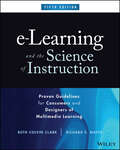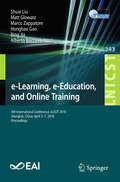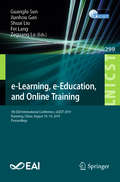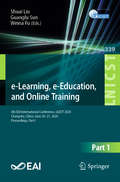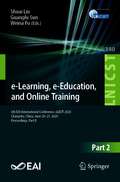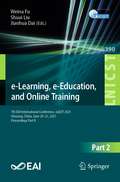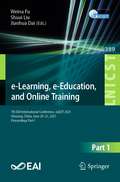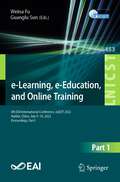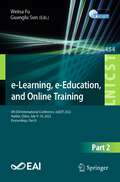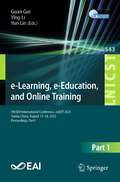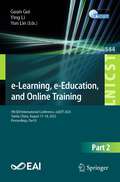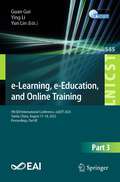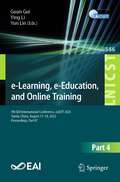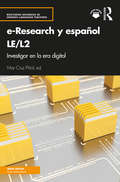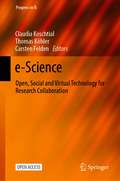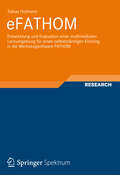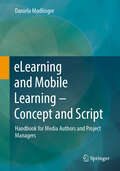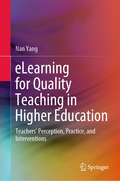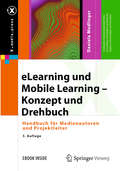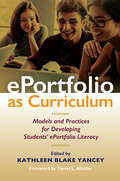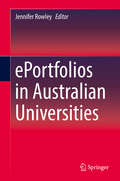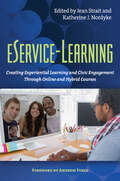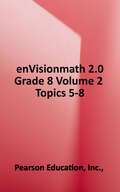- Table View
- List View
e-Learning and the Science of Instruction: Proven Guidelines for Consumers and Designers of Multimedia Learning
by Ruth C. Clark Richard E. MayerImprove the quality of your eLearning materials with evidence-based guidelines e-Learning and the Science of Instruction, 5th Edition: Proven Guidelines for Consumers and Designers of Multimedia Learning helps practitioners apply evidence-based principles to the design, development, and selection of digital instructional and training materials. This book goes beyond instructional design advice, providing actionable ideas and multimedia examples based on recent research findings. You will learn how to put evidence into practice, with proven e-learning design and development guidelines. During the pandemic, e-learning assumed a much greater role as an instructional delivery medium, especially with virtual classrooms using tools such as Zoom and MS Teams. The combination of new technological functionality, increases in a remote workforce, and new research findings have led to gaps regarding how to leverage digital learning most effectively. This book explains what instructional designers, multimedia developers, and e-learning consumers need to know to maximize the potential of their e-learning resources. In addition to guidelines regarding use of graphics, audio, text, engagement techniques and collaborative online learning, this new edition covers video-based instruction, digital games, and immersive virtual reality-, showing you when and how to utilize these tools effectively. Discover the latest research findings about how people learn—and how they learn best online Build instructional materials, including video instruction, digital games, and immersive VR experiences, that empower learners to succeed Get ideas and inspiration for engaging learners in synchronous and asynchronous environments See concrete examples of how research evidence in instructional design can be applied in practice Apply evidence regarding how best to leverage collaborative online learning e-Learning and the Science of Instruction is a valuable resource for students and practitioners who need to design, develop, and select effective eLearning and virtual training materials.
e-Learning, e-Education, and Online Training: 4th International Conference, eLEOT 2018, Shanghai, China, April 5–7, 2018, Proceedings (Lecture Notes of the Institute for Computer Sciences, Social Informatics and Telecommunications Engineering #243)
by Alberto Bucciero Marco Zappatore Shuai Liu Matt Glowatz Honghao Gao Bing JiaThis book constitutes the proceedings of the 4rd International Conference on e-Learning, e-Education, and Online Training, eLEOT 2018, held in Shanghai, China, in April 2018. The 49 revised full papers presented were carefully reviewed and selected from 120 submissions. They focus on most recent and innovative trends in this broad area, ranging from distance education to collaborative learning, from interactive learning environments to the modelling of STEM (Science, Technology, Mathematics, Engineering) curricula.
e-Learning, e-Education, and Online Training: 5th EAI International Conference, eLEOT 2019, Kunming, China, August 18–19, 2019, Proceedings (Lecture Notes of the Institute for Computer Sciences, Social Informatics and Telecommunications Engineering #299)
by Guanglu Sun Zeguang Lu Shuai Liu Jianhou Gan Fei LangThis book constitutes the proceedings of the 5th International Conference on e-Learning, e-Education, and Online Training, eLEOT 2019, held in Kunming, China, in August 2019. The 46 revised full papers presented were carefully reviewed and selected from 99 submissions. They focus on most recent and innovative trends in this broad area, ranging from distance education to collaborative learning, from interactive learning environments to the modelling of STEM (Science, Technology, Mathematics, Engineering) curricula.
e-Learning, e-Education, and Online Training: 6th EAI International Conference, eLEOT 2020, Changsha, China, June 20-21, 2020, Proceedings, Part I (Lecture Notes of the Institute for Computer Sciences, Social Informatics and Telecommunications Engineering #339)
by Guanglu Sun Shuai Liu Weina FuThis 2-volume set constitutes the proceedings of the 6th International Conference on e-Learning, e-Education, and Online Training, eLEOT 2020, held in Changsha, China, in June 2020. The conference was held virtually due to the COVID-19 pandemic. The 68 full papers presented were carefully reviewed and selected from 141 submissions. They focus on most recent and innovative trends and new technologies in for educational modernization, such as artificial intelligence and big data. The theme of eLEOT 2020 was “Education with New Generation Information Technology”.
e-Learning, e-Education, and Online Training: 6th EAI International Conference, eLEOT 2020, Changsha, China, June 20-21, 2020, Proceedings, Part II (Lecture Notes of the Institute for Computer Sciences, Social Informatics and Telecommunications Engineering #340)
by Guanglu Sun Shuai Liu Weina FuThis 2-volume set constitutes the proceedings of the 6th International Conference on e-Learning, e-Education, and Online Training, eLEOT 2020, held in Changsha, China, in June 2020. The conference was held virtually due to the COVID-19 pandemic. The 68 full papers presented were carefully reviewed and selected from 141 submissions. They focus on most recent and innovative trends and new technologies in for educational modernization, such as artificial intelligence and big data. The theme of eLEOT 2020 was “Education with New Generation Information Technology”.
e-Learning, e-Education, and Online Training: 7th EAI International Conference, eLEOT 2021, Xinxiang, China, June 20-21, 2020, Proceedings Part II (Lecture Notes of the Institute for Computer Sciences, Social Informatics and Telecommunications Engineering #390)
by Shuai Liu Weina Fu Jianhua DaiThis 2-volume set constitutes the proceedings of the 7th International Conference on e-Learning, e-Education, and Online Training, eLEOT 2021, held in Xinxiang, China, in June 2021. The 104 full papers presented were carefully reviewed and selected from 218 submissions. The papers are structured into two subject areas: New Trends of Teaching: Evaluation, Reform and Practice, and Intelligent Learning and Education. They focus on most recent and innovative trends and new technologies of online education which grows quickly and becomes the educational trend today. The theme of eLEOT 2021 was “The Educational Revolution: Opportunities and Challenges brought by COVID-19”.
e-Learning, e-Education, and Online Training: 7th EAI International Conference, eLEOT 2021, Xinxiang, China, June 20-21, 2021, Proceedings Part I (Lecture Notes of the Institute for Computer Sciences, Social Informatics and Telecommunications Engineering #389)
by Shuai Liu Weina Fu Jianhua DaiThis 2-volume set constitutes the proceedings of the 7th International Conference on e-Learning, e-Education, and Online Training, eLEOT 2021, held in Xinxiang, China, in June 2021. The 104 full papers presented were carefully reviewed and selected from 218 submissions. The papers are structured into two subject areas: New Trends of Teaching: Evaluation, Reform and Practice, and Intelligent Learning and Education. They focus on most recent and innovative trends and new technologies of online education which grows quickly and becomes the educational trend today. The theme of eLEOT 2021 was “The Educational Revolution: Opportunities and Challenges brought by COVID-19”.
e-Learning, e-Education, and Online Training: 8th EAI International Conference, eLEOT 2022, Harbin, China, July 9–10, 2022, Proceedings, Part I (Lecture Notes of the Institute for Computer Sciences, Social Informatics and Telecommunications Engineering #453)
by Guanglu Sun Weina FuThe two-volume set, LNICST 453 and 454 constitutes the proceedings of the 8th EAI International Conference on e-Learning, e-Education, and Online Training, eLEOT 2022, held in Harbin, China, in July 2022.The 111 papers presented in this volume were carefully reviewed and selected from 226 submissions. This conference has brought researchers, developers and practitioners around the world who are leveraging and developing e-educational technologies as well as related learning, training, and practice methods. The theme of eLEOT 2022 was “New Trend of Information Technology and Artificial Intelligence in Education”. They were organized in topical sections as follows: IT promoted Teaching Platforms and Systems; AI based Educational Modes and Methods; Automatic Educational Resource Processing; Educational Information Evaluation.
e-Learning, e-Education, and Online Training: 8th EAI International Conference, eLEOT 2022, Harbin, China, July 9–10, 2022, Proceedings, Part II (Lecture Notes of the Institute for Computer Sciences, Social Informatics and Telecommunications Engineering #454)
by Guanglu Sun Weina FuThe two-volume set, LNICST 453 and 454 constitutes the proceedings of the 8th EAI International Conference on e-Learning, e-Education, and Online Training, eLEOT 2022, held in Harbin, China, in July 2022.The 111 papers presented in this volume were carefully reviewed and selected from 226 submissions. This conference has brought researchers, developers and practitioners around the world who are leveraging and developing e-educational technologies as well as related learning, training, and practice methods. The theme of eLEOT 2022 was “New Trend of Information Technology and Artificial Intelligence in Education”. They were organized in topical sections as follows: IT promoted Teaching Platforms and Systems; AI based Educational Modes and Methods; Automatic Educational Resource Processing; Educational Information Evaluation.
e-Learning, e-Education, and Online Training: 9th EAI International Conference, eLEOT 2023, Yantai, China, August 17-18, 2023, Proceedings, Part I (Lecture Notes of the Institute for Computer Sciences, Social Informatics and Telecommunications Engineering #543)
by Ying Li Yun Lin Guan GuiThis four-volume set constitutes the post-conference proceedings of the 9th EAI International Conference on e-Learning, e-Education, and Online Training, eLEOT 2023, held in Yantai, China, during August 17-18, 2023. The 104 full papers presented were selected from 260 submissions. The papers reflect the evolving landscape of education in the digital age. They were organized in topical sections as follows: IT promoted teaching platforms and systems; AI based educational modes and methods; automatic educational resource processing; educational information evaluation.
e-Learning, e-Education, and Online Training: 9th EAI International Conference, eLEOT 2023, Yantai, China, August 17-18, 2023, Proceedings, Part II (Lecture Notes of the Institute for Computer Sciences, Social Informatics and Telecommunications Engineering #544)
by Ying Li Yun Lin Guan GuiThis four-volume set constitutes the post-conference proceedings of the 9th EAI International Conference on e-Learning, e-Education, and Online Training, eLEOT 2023, held in Yantai, China, during August 17-18, 2023.The 104 full papers presented were selected from 260 submissions. The papers reflect the evolving landscape of education in the digital age. They were organized in topical sections as follows: IT promoted teaching platforms and systems; AI based educational modes and methods; automatic educational resource processing; educational information evaluation.
e-Learning, e-Education, and Online Training: 9th EAI International Conference, eLEOT 2023, Yantai, China, August 17-18, 2023, Proceedings, Part III (Lecture Notes of the Institute for Computer Sciences, Social Informatics and Telecommunications Engineering #545)
by Ying Li Yun Lin Guan GuiThis four-volume set constitutes the post-conference proceedings of the 9th EAI International Conference on e-Learning, e-Education, and Online Training, eLEOT 2023, held in Yantai, China, during August 17-18, 2023.The 104 full papers presented were selected from 260 submissions. The papers reflect the evolving landscape of education in the digital age. They were organized in topical sections as follows: IT promoted teaching platforms and systems; AI based educational modes and methods; automatic educational resource processing; educational information evaluation.
e-Learning, e-Education, and Online Training: 9th EAI International Conference, eLEOT 2023, Yantai, China, August 17-18, 2023, Proceedings, Part IV (Lecture Notes of the Institute for Computer Sciences, Social Informatics and Telecommunications Engineering #546)
by Ying Li Yun Lin Guan GuiThis four-volume set constitutes the post-conference proceedings of the 9th EAI International Conference on e-Learning, e-Education, and Online Training, eLEOT 2023, held in Yantai, China, during August 17-18, 2023.The 104 full papers presented were selected from 260 submissions. The papers reflect the evolving landscape of education in the digital age. They were organized in topical sections as follows: IT promoted teaching platforms and systems; AI based educational modes and methods; automatic educational resource processing; educational information evaluation.
e-Research y español LE/L2: Investigar en la era digital (Routledge Advances in Spanish Language Teaching)
by Mar Cruz Piñole-Research y español LE/L2: Investigar en la era digital es el primer volumen que aborda de manera conjunta las aportaciones al español LE/L2 de la lingüística de corpus, la biblioteconomía y la edición digital. Es excelente para mejorar las técnicas de investigación a la vez que se toma conciencia sobre el uso de las tecnologías en los estudios sobre el español LE/L2.Características principales: visión interdisciplinar e internacional a partir del trabajo de expertos que ejercen su actividad docente, investigadora y profesional en diferentes ámbitos y en distintos países planteamiento teórico-práctico mediante la exposición de una reflexión teórica y la descripción de casos prácticos sólido marco teórico que se presenta en los dos primeros capítulos estructura homogénea dividida en útiles apartados (necesidades, cómo ayudan las tecnologías y casos concretos) para que el lector pueda localizar los contenidos con facilidad lectura del volumen que puede ser lineal (capítulo tras capítulo) o transversal (por ejemplo, los casos prácticos que se presentan en cada capítulo) materiales complementarios en línea, como, por ejemplo, glosario hipertextual y enlaces a los corpus y programas mencionados en los capítulos Escrito en español, de manera clara y accesible, y con abundantes ejemplos e ilustraciones, e-Research y español LE/L2: Investigar en la era digital es ideal para todas aquellas personas vinculadas con la investigación en torno al español LE/L2: estudiantes de máster y doctorado, directores de tesis (PhD o máster) y profesores.e-Research y español LE/L2: Investigar en la era digital is the first volume that jointly addresses the contributions of corpus linguistics, librarianship and digital publishing to Spanish as a second or foreign language (LE/L2). It is excellent for improving research techniques while raising awareness about the use of technologies in studies of Spanish LE/L2.Main features: interdisciplinary and international vision based on the work of experts who carry out their teaching, research and professional activities in different fields and in different countries theoretical-practical approach through the presentation of a theoretical reflection and the description of practical cases solid theoretical framework which is presented in the first two chapters each chapter is divided into three useful sections (needs, how technologies help, and specific cases) so that the reader can easily locate the contents reading can be linear (chapter by chapter) or transversal (for example, the practical cases presented in each chapter) supplementary online materials include a hypertext glossary and links to the corpus and programs mentioned in the chapters Written in Spanish, in a clear and accessible way, and with abundant examples and illustrations, e-Research y español LE/L2: Investigar en la era digital is ideal for all those involved in research on Spanish LE/L2, master's and doctoral students, thesis supervisors and professors.
e-Science: Open, Social and Virtual Technology for Research Collaboration (Progress in IS)
by Thomas Köhler Claudia Koschtial Carsten FeldenThis open access book shows the breadth and various facets of e-Science, while also illustrating their shared core. Changes in scientific work are driven by the shift to grid-based worlds, the use of information and communication systems, and the existential infrastructure, which includes global collaboration. In this context, the book addresses emerging issues such as open access, collaboration and virtual communities and highlights the diverse range of developments associated with e-Science. As such, it will be of interest to researchers and scholars in the fields of information technology and knowledge management.
eFATHOM
by Tobias HofmannTobias Hofmann entwickelt eine multimediale Lernumgebung zur Einführung in die Stochastik- und Datenanalysesoftware FATHOM und evaluiert sie zielgerichtet mit Schülerinnen und Schülern sowie mit Studierenden. Die Lernumgebung eFATHOM vermittelt die Funktionen der Software und unterstützt Lernende dabei, sie zur stochastischen Problemlösung einzusetzen. Themenschwerpunkte sind die Einführung in die Datenauswertung und in die Simulation mit FATHOM, die in jeweils zwei Modulen durch Tutorial-Videos vermittelt werden, wobei Lernende die vorgestellten Handlungen aktiv nachvollziehen können.
eLearning and Mobile Learning - Concept and Script: Handbook for Media Authors and Project Managers
by Daniela ModlingerThis practical handbook provides a well-founded insight into the complex preparatory work for the realisation of eLearning projects. The book describes how project managers and media authors work as a team to create a script for eLearning that fulfils learning psychology criteria and current multimedia didactics. Tools for designing and writing scripts are presented and evaluated so that a needs-based selection is possible. The third edition has been revised and updated throughout. A new chapter on "Mobile Learning" shows the latest developments. The draft of instructional videos and the possibilities of the social web are explained in detail. Enriched with valuable tips for work organisation and an outline of the media author's job description, the handbook is aimed at project managers and specialists in companies, further education institutions and multimedia agencies as well as media authors and those who want to become one. Numerous checklists facilitate daily work, e.g. for checking a finished script - a quality assurance measure that helps save time and money. Written directly for everyday professional use, the book uses practical methods and work aids as well as tips and tricks to show how a strong draft and a carefully prepared script make a decisive contribution to the successful production of eLearning applications.
eLearning for Quality Teaching in Higher Education: Teachers’ Perception, Practice, and Interventions
by Nan YangThis book explores the impact of eLearning on the quality of teaching in higher education, focusing on three main issues: university teachers’ perception of quality teaching, their strategies for achieving quality teaching in practice, and interventions that design and implement online collaborative activities in a large class. The book argues that if eLearning targets the real problems in practice and is appropriately designed and implemented, it can improve the teaching quality at universities. It also demonstrates the complexity of teachers’ perception of quality teaching and contextual factors that affect teaching practice and quality. Further, it explores university teachers’ perception of quality teaching in Italy, the UK and China – an aspect that is rarely addressed in the literature – and reveals why the impact of ICTs on university teaching is not as great as in other fields by explaining the issues that threaten the quality of day-to-day teaching. Lastly, it confirms that traditional lecturing, combined with online collaborative activities, improves the quality of teaching compared to traditional lecturing alone. As such, this book is a necessary and important resource for the research community.
eLearning und Mobile Learning – Konzept und Drehbuch: Handbuch für Medienautoren und Projektleiter (X.media.press)
by Daniela ModlingerIn dem Praxishandbuch beschreibt die Autorin, wie ein Drehbuch nach lernpsychologischen und didaktischen Kriterien erstellt werden kann. Sie stellt Werkzeuge für das Konzipieren und Schreiben vor und evaluiert sie. Das Buch und die begleitende Website bieten zahlreiche Hilfsmittel: u. a. eine Checkliste zur Prüfung des fertigen Drehbuchs und eine Qualitätssicherungsmaßnahme, die Zeit und Kosten spart. Die Neuauflage wurde durchgehend aktualisiert. Für Projektleiter in Multimediaagenturen, Fachleute in Unternehmen sowie (zukünftige) Drehbuchautoren.
ePortfolio as Curriculum: Models and Practices for Developing Students’ ePortfolio Literacy
by Kathleen Blake YanceyAt a moment when the ePortfolio has been recognized as a high impact practice – as a unique site for hosting student integrative learning and as a powerful genre for assessment – this book provides faculty, staff, and administrators with a set of frameworks and models useful for guiding students in designing and creating ePortfolios that clearly communicate their purpose and effectively use the affordances of the medium.In short, this book both illustrates and provides guidance on how to support the development of students’ ePortfolio literacy. The ePortfolio curricular models provided in ePortfolio as Curriculum include both those integrated within existing disciplinary courses and those offered through credit-bearing stand-alone courses.In taking up questions focused on what students need to know and do in becoming informed, effective ePortfolio makers, the contributors to this volume – from the standpoint of their course outcomes and institutional contexts – present various approaches to developing an ePortfolio curriculum. Individually and collectively, the chapters explain ways to engage students in understanding the potential purposes, structures, audiences, and designs of ePortfolios; in developing the reflective practices for contextualizing and informing the selection and curation of artifacts; and in creating appropriate focus and coherence.Synthesizing insights from the previous chapters, the concluding chapter identifies six consistent features of an ePortfolio curriculum that support the development of students' ePortfolio literacy. In addition, Kathleen Blake Yancey identifies and defines seven common ePortfolio curricular dimensions that contribute to students' ePortfolio literacy, among them student agency, digital identity, and campus and global citizenship. Not least, she describes new practices emerging from ePortfolio curricula, including new ePortfolio-specific genres; new metaphors used to characterize ePortfolios and their practices; and new issues that the ePortfolio curriculum raises.
ePortfolios in Australian Universities
by Jennifer RowleyThis book focuses on essential findings concerning emerging practices of student learning through the teaching and learning benefits of the electronic portfolio (ePortfolio) in a range of disciplines at Australian universities. It explores the latest research on ePortfolios, teaching quality, future research directions for tertiary learning and teaching, institutional agendas in higher education, and the role that the ePortfolios can play in supporting improvements in pedagogic practice and student outcomes. Included in these agendas is research into the development of higher education through the technologising of pedagogy, learner identities in discrete disciplines, and the praxis of individual university teachers. The book covers accounts of academic learning success and challenges across current higher education subject areas. By presenting case study accounts of ePortfolio use, it reveals the importance of defining and documenting how we can meaningfully develop learner portfolios in research, teaching and learning at Australian universities. With an intentional research base, the book draws on work conducted inside and outside Australia and highlights how the ePortfolio can help tertiary staff prepare for the impact of a student-created portfolio on teaching, learning, and subsequent academic scholarship.
eService-Learning: Creating Experiential Learning and Civic Engagement Through Online and Hybrid Courses
by Jean Strait Katherine J. NordykeThis book serves as an introduction to using online teaching technologies and hybrid forms of teaching for experiential learning and civic engagement. Service-learning has kept pace neither with the rapid growth in e-learning in all its forms nor with the reality that an increasing number of students are learning online without exposure to the benefits of this powerful pedagogy.Eservice-learning (electronic service-learning) combines service-learning and on-line learning and enables the delivery of the instruction and/or the service to occur partially or fully online. Eservice-learning allows students anywhere, regardless of geography, physical constraints, work schedule, or other access limitations, to experience service-learning. It reciprocally also equips online learning with a powerful tool for engaging students.In eservice-learning, the core components of service, learning, and reflection may take a different form due to the online medium—for example, reflection often occurs through discussion board interactions, journals, wikis, or blogs in an eservice-learning course. Moreover, the service, though still community-based, creates a world of opportunities to connect students with communities across the globe—as well as at their very own doorstep.This book introduces the reader to the four emerging types of eservice-learning, from Extreme EService-Learning (XE-SL) classes where 100% of the instruction and 100% of the service occur online, to three distinct forms of hybrid where either the service or the instruction are delivered wholly on-line – with students, for instance, providing online products for far-away community partners – or in which both are delivered on-site and online. It considers the instructional potential of common mobile technologies – phones, tablets and mobile reading devices. The authors also address potential limitations, such as technology challenges, difficulties sustaining three-way communication among the instructor, community partner, and students, and added workload.The book includes research studies on effectiveness as well as examples of practice such drafting grants for a community partner, an informational technology class building online communities for an autism group, and an online education class providing virtual mentoring to at-risk students in New Orleans from across the country.
enVision Geometry Core Student Edition Geometry Grade 9/10
by Dan KennedyenVision Geometry Core Student Edition Geometry Grade 9/10
enVision MATH 2.0, Grade 3, Volume 2, Topics 9-16
by Randall I. Charles Janet H. Caldwell Warren Crown Francis Fennell Juanita CopleyenVision MATH 2.0, Grade 3, Volume 2, Topics 9-16
enVision Math 2. 0 Common Core: Volume 2
by Robert Q. Berry Zachary Champagne Eric Milou IiiWith expert-verified solutions from enVisionmath 2.0: Grade 8, Volume 2 1st Edition, you’ll learn how to solve your toughest homework problems. Our resource for enVisionmath 2.0: Grade 8, Volume 2 includes answers to chapter exercises, as well as detailed information to walk you through the process step by step. With expert solutions for thousands of practice problems, you can take the guesswork out of studying and move forward with confidence.
